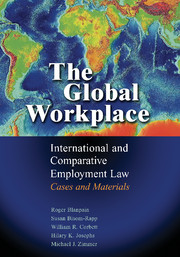Book contents
- Frontmatter
- Contents
- Acknowledgments
- Table of Cases
- Table of Statutes
- Table of Secondary Authorities
- 1 The Study of International and Comparative Employment Law
- 2 The International Labour Organization and International Labor Standards
- 3 The United States
- 4 Canada
- 5 Mexico
- 6 The Regulatory Approach of the North American Free Trade Agreement
- 7 The European Union
- 8 The United Kingdom
- 9 Germany
- 10 France
- 11 China
- 12 Japan
- 13 India
- 14 Pursuing International Labor Standards in U.S. Courts and Through Global Codes of Conduct
- Index
8 - The United Kingdom
Published online by Cambridge University Press: 05 June 2012
- Frontmatter
- Contents
- Acknowledgments
- Table of Cases
- Table of Statutes
- Table of Secondary Authorities
- 1 The Study of International and Comparative Employment Law
- 2 The International Labour Organization and International Labor Standards
- 3 The United States
- 4 Canada
- 5 Mexico
- 6 The Regulatory Approach of the North American Free Trade Agreement
- 7 The European Union
- 8 The United Kingdom
- 9 Germany
- 10 France
- 11 China
- 12 Japan
- 13 India
- 14 Pursuing International Labor Standards in U.S. Courts and Through Global Codes of Conduct
- Index
Summary
INTRODUCTION
The United Kingdom consists of England, Scotland, Wales, and Northern Ireland. For the most part, the labor law of the United Kingdom can be treated as a single system with no major differences among the jurisdictions.
The labor law of the United Kingdom must be considered in the context of the supranational law of the European Union. In 1997, after the election of the Labour Party, the United Kingdom signed the Amsterdam Treaty, subjecting it to directives under the Maastricht Treaty's Social Protocol. It is the obligation of EU members to ensure that their law conforms to the requirements of directives, which are Community law. A member, such as the United Kingdom, can determine that its existing law conforms to Community law, can amend its existing law to come into compliance, or it can pass new laws. The United Kingdom has enacted a number of labor laws intended to bring its law into conformity with EU directives. The most significant law is the Employment Relations Act of 1999. The United Kingdom's membership in the EU and its attendant obligations must be kept in mind as one studies U.K. labor law. Refer to Chapter 7 on the European Union for further discussion of European Community labor law. For a useful table correlating EU employment directives with implementing U.K. legislation, see http://www.dti.gov.uk/employment/employment-legislation/employment-directives/index.html.
- Type
- Chapter
- Information
- The Global WorkplaceInternational and Comparative Employment Law - Cases and Materials, pp. 332 - 393Publisher: Cambridge University PressPrint publication year: 2007



